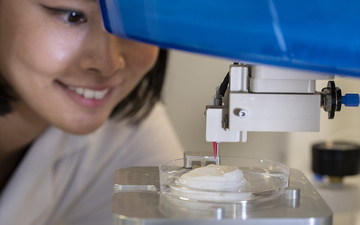
Burns, surgery, and illness can all leave people with scars on their face and head. These conditions can cause functional problems, like difficulty smiling, eating, or blinking.
Some people are also born without parts of their face, like earlobes (this condition is called microtia.)
Adding new earlobes or repairing facial scarring with reconstructive surgery currently has a high cost to the patient. If someone decides to have surgery to reconstruct their face, surgeons use existing rib cartilage to make ears and noses. This invasive procedure causes pain and scarring.
The impact of having facial scars or missing facial features can also be psychological.
How we look also can change how people treat us and how we feel about ourselves. Many people with marks on their face say they are treated unfairly because of their visible difference. A recent study by Changing Faces found that almost 50% of people with a visible difference have experienced hostile behaviour like staring or bullying (Changing Faces). While some people feel confident in their appearance, others might feel ashamed or anxious about how they look.
As part of our mission to transform the lives of those living with scarring, we fund a world-leading pioneering programme of facial reconstruction research. We want to better support the mental health of people with facial scarring and use 3D printing to offer an alternative to invasive surgery to collect cartilage.
The Scar Free Foundation and Health and Care Research Wales Programme of Regenerative Medicine is based at Swansea University.
Learn more about the flagship project, 3D Bioface, below:
The programme’s flagship project is the development of new techniques for 3D printing facial cartilage. This innovative research brings us one step closer to making new ears and noses for patients who lost theirs through accident, injury, or illness. Read more about this exciting project here: BIOFACE
The team has also been working on studies to find out key information about facial scarring in Wales such as how many people have facial scars and how they feel about their appearance. This research will help guide healthcare strategies in the future, so patients get the best support. Read more: AFFECT
Our programme is funded in partnership with Health & Care Research Wales, Reconstructive Surgery & Regenerative Medicine at Swansea University Medical School and the Welsh Centre for Burns & Plastic Surgery. The programme is led by Professor Iain Whitaker, Chair of Plastic Surgery at Swansea University Medical School and Surgical Specialty Lead for Health and Care Research Wales.